
Alexander Heinle
Alex is a marketer at Zavvy. On this blog, he mainly shares insights gained from discussions with selected experts and from helping our customers set up and improve their onboarding or learning programs.

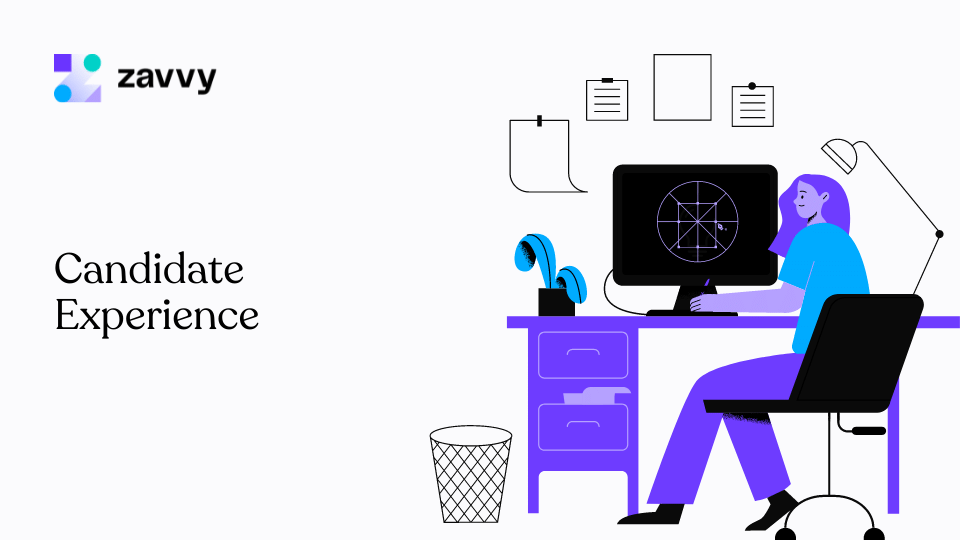
“I have learned that people will forget what you said, people will forget what you did, but people will never forget how you made them feel.”
- Maya Angelou
As the war for talent gets fiercer, every stakeholder (especially candidates) is solely interested in an organization’s candidate experience.
This article will explore what candidate experience is, why it is vital to build an engaging candidate experience, best practices for improving candidate experience, and case studies of five (5) companies with a game-changing candidate experience and what you can learn from them.
Together with our curators, we have created a library of actionable digital marketing resources. Personalized to your team's needs.
While often overlooked or ignored, the candidate experience is a major touchpoint for any company looking to position itself as people-first and enhance its employer brand.
A company’s candidate experience contains (but isn’t limited to):
Candidate experience is a cornerstone of the candidate journey and recruitment experience — all of which impact your employer brand.
For example, a candidate with excellent recruitment experience will likely post glowing reviews of you on social media platforms and employer branding platforms like Glassdoor and recommend you as an employer of choice to their network.
On the other hand, if a job seeker has a negative recruitment experience with a company, they’re likely to leave negative reviews on Glassdoor or Indeed, warn their network from applying at your company, and in some cases, stop using your products or services and dissuade others from doing so.
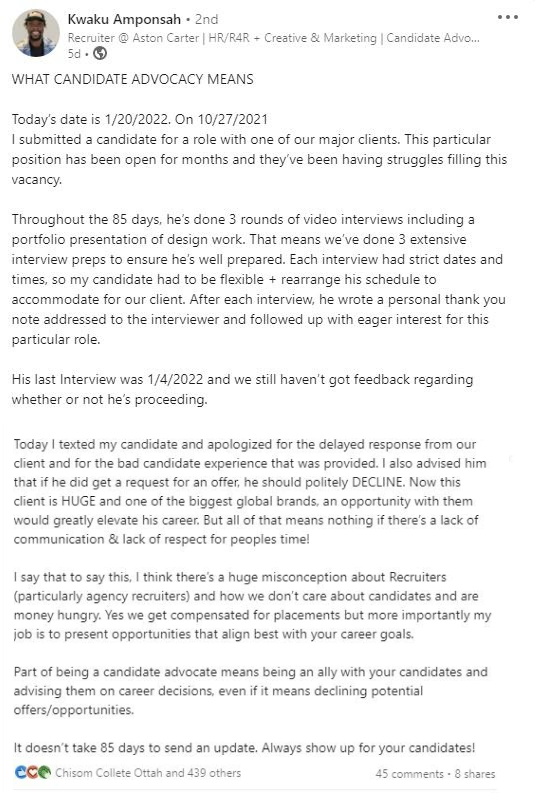
This shows that how you treat candidates during these touchpoints will culminate into how they perceive your employer brand.
As the first stage of your recruiting experience, the candidate experience is essential because it immediately influences a jobseeker’s decision to continue with their application or find their next job somewhere else.
However, it’s disheartening to see that some companies are yet to understand the importance of a positive candidate experience. A few scrolls on social media platforms like LinkedIn, using the hashtag (#candidateexperience), show how frustrating the job hunt can be for candidates. These frustrations often lead to a job decline even when offered the opportunity.
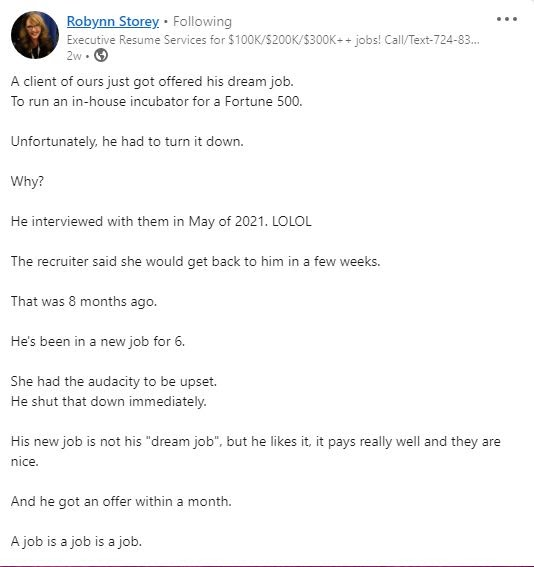
Companies looking to create a positive candidate experience need to go back to the basics. This involves reviewing your hiring experience, right from application to job rejection, job offer, and onboarding. For starters, make your application process as stress-free as possible. 60% of job seekers quit midway when filling out online job applications because of their length or complexity.
Ensure your company’s career page is aesthetically pleasing, user-friendly, and that your job descriptions are clear and straight to the point. Additionally, job seekers are looking to work with transparent companies about what they offer. A Glassdoor site survey showed that the top 5 pieces of information job seekers wanted to see on job ads were:
A big part of building a great candidate experience is the ability of a company to make hiring decisions quickly. A survey by Google on its hiring process shows that four interviews are informed to make an informed hiring decision — a sharp contrast compared to the seven or eight-step interview process currently plaguing the job market.
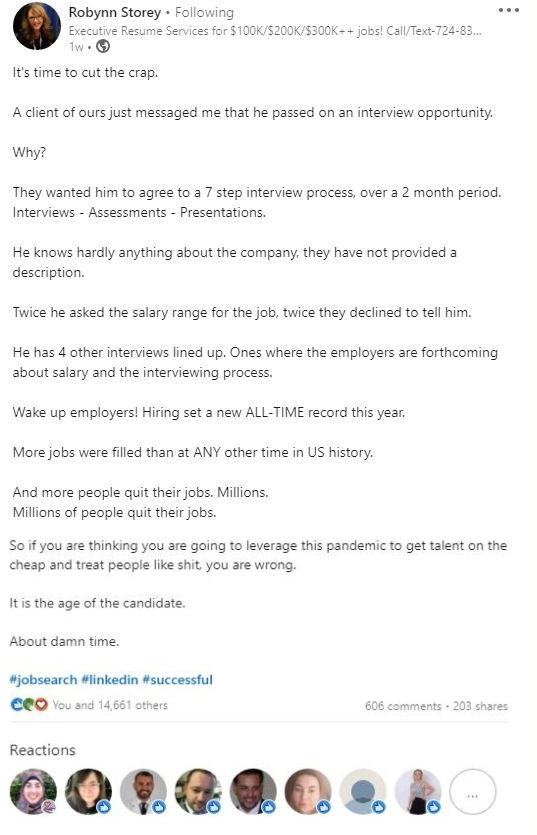
All these show that you should never underestimate the importance of a great candidate experience.
So, why is a great candidate experience necessary?
The world of recruitment is becoming candidate-led. Employers can no longer expect to post a job, paste a supposedly decent salary range alongside it, and wait for the floodgate of applications to pour in. Instead, today’s job seekers have raised their standards, and their decision to work for a company hinges on several factors, including how you treat them during the recruitment process.
Today’s top talents aren’t short of employment options and would look for work elsewhere if your candidate experience falls below their expectations. But unfortunately, they are also unlikely to consider you in the future or recommend you to their friends, family, and network. This is why 63% of candidates will likely reject a job offer because of a bad candidate experience.
When job seekers begin their search, they look for things like “Top companies to work for in 2022,” “Top companies to work for in X industry,” or “Working at XYZ company Glassdoor review.”
It makes sense, though, because a company’s reputation matters more than ever. So it is no wonder that applicants turn to social media, job boards, and employer branding platforms to inform their job search. Since interviews are a two-way street, applicants are also assessing if you are worth their skills and dedication as much as you’re assessing them. On average, candidates will read six company reviews before forming an opinion about a company, which makes it easy for them to determine if a company is worth working for or not.
Therefore, if you have a bad reputation in terms of recruitment and employee retention, there’s a high chance that job seekers won’t even submit their applications in the first place, let alone interview with you.
“Your employer brand is never what you say it is. It is what your employees and candidates say it is.”
- Jillian Einck
Many applicants believe that how you treat them during the hiring process determines how they will be treated once they become employees. And they aren’t wrong.
When job seekers apply, quite a few factors increase their desire to work for you, including...
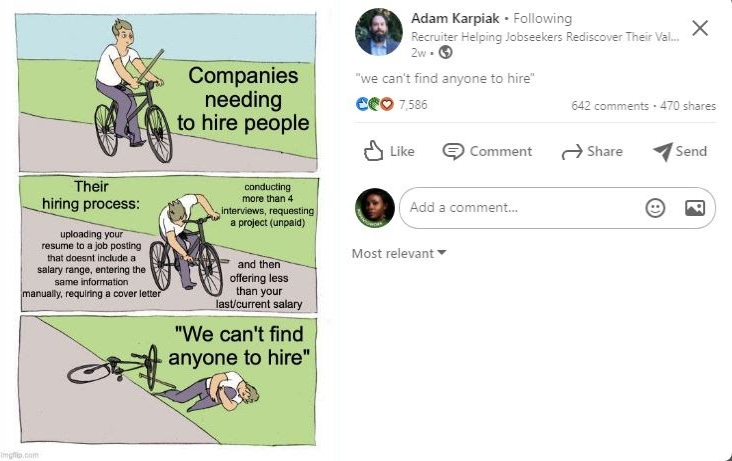
Likewise, a terrible application process, long communication gaps between candidate and company, and an overall poor candidate experience will leave a bad taste in their mouths and create a negative impression.
Still thinking that employer branding shouldn’t be taken seriously? Check out these eye-opening statistics from Glassdoor:
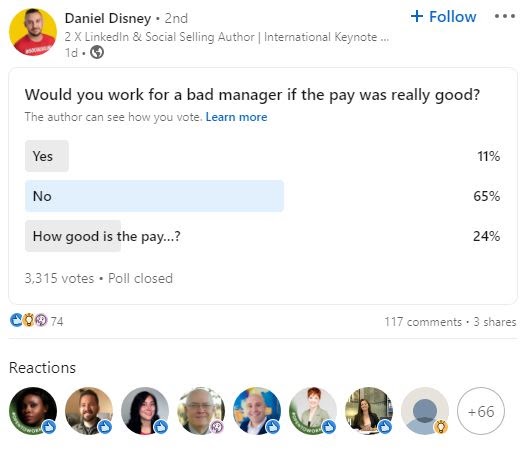
How a candidate is treated during the hiring process reflects on your employer brand and affects how they view your brand as a whole. For example, giving 100 candidates who could be potential customers a negative candidate experience means you’ve lost 100 potential customers.
You could be losing a thousand customers per candidate when you add their friends, family, and the vast network they’re exposed to. When you add social media users who read each candidate’s experience into the mix, the number of potential customers you lose increases by a thousand; hence, devaluing your brand.
The power of candidate experience is so strong that Virgin Media discovered that they were losing $5 million yearly in potential sales revenue thanks to a poor candidate experience. Imagine a company losing that massive chunk of money. Painful, right?
Improving candidate experience is a must-do to win the war for talent. If you’re looking to improve your hiring experience and ensure a positive candidate experience, these top five tips should steer you onto the right path.
A job description could make or break your hiring process. A survey discovered that one-third of new hires left their jobs after six months. Hence: If your new hire feels like the job and business doesn’t align with what they’re looking for, you might need to review your hiring process, starting with your job description.
A good job description should be clear and include all vital information about the position, who the role reports to, responsibilities to perform, other team members to work with, etc. While job descriptions in every organization vary, basic information in a job description includes:
One great way to improve candidate experience is to ask candidates what time works for them for interviews and meetings. Never assume that jobseekers (especially those unemployed for long) have nothing to do and can attend interviews whenever you deem fit. Instead, navigate around the times communicated by the candidates, even if it means scheduling conversations outside of business hours, during public holidays, or later in the day.
A CareerBuilder research shows that 82% of candidates believed that communicating expectations about a company’s recruiting process improved their overall candidate experience. Be clear about what your hiring process looks like. How long does each hiring stage take? Who do candidates reach out to when following up on the status of their applications?
The goal is to be a fantastic resource of knowledge to candidates — for example, Salesforce’s How We Hire, and Slack’s A Walkthrough Guide to Finding an Engineering Job at Slack gives a transparent and detailed look into both company's recruiting process.
A Jobvite 2017 Recruiting Funnel Benchmark Report showed that career sites ranked second ( 33.90%) in the top five platforms for job applications. This information can only mean ONE THING: career sites are important and can improve candidate experience. Your career page should showcase your company’s employer value propositions and be the best brand advocate for your business. A good company career site should also be a one-stop resource for all candidates' answers and must contain helpful, informational, and relevant content.
There is often a vast gap between signing a job offer and starting; because many new hires get lost in this process.
This is where preboarding comes in.
Put yourself in the shoes of an applicant:
You see a job that's a great fit, you send in your application, attend interviews and receive a job offer. After signing, a start date is communicated, and you don't hear from the company until you resume.
During the days leading up to resumption, your new hires begin to develop anxiety, and various thoughts about what their first day would look like run through their minds. They feel helpless, alone, and jittery.
Preboarding removes these from the equation and helps them settle comfortably, especially on their first day.
Onboarding, on the other hand, begins the day they clock in. Research by Brandon Hall Group showed that organizations with a strong onboarding process increased retention by 82% and productivity by over 70%. In the same vein, results from a Gallup study showed that only 12% of employees strongly agree their organization has a great onboarding process. Yes - 88% believe their companies did a poor job onboarding them and that companies need to invest more in onboarding.
Additionally, two top onboarding strategies guaranteed to create a memorable impression in the minds of your new employees are integrating remote hires into a company’s processes and culture and creating a welcome package.
To find out what job seekers think about your company's hiring process, ask for feedback by conducting a candidate experience survey. Examples of questions to ask in your candidate survey include:
Pro Tip:
Companies looking to build a positive candidate experience can send surveys during the following stages:
Pre-interview: Send a candidate experience survey to all candidates to glean information about how your brand is perceived.
Post-interview: Post-interview surveys help you learn more about candidates' first impressions about your organization, what they loved about the overall hiring process and how you could improve.
Final stage: Gain insights into communication strengths and weaknesses, delivery of information and its consistency, and other variables where you fell short of their expectations.
New employees: While there’s a high chance that information provided here may be biased, it doesn’t hurt to give it a try. Ask questions about their expectations, if their roles were what they expected, and how your organization can help future hires enjoy a positive candidate experience.
Job rejections: Expect that the responses gotten from rejected candidates could be bitter and hurtful, but take them seriously. Since they have nothing to lose, most would share insights they wouldn’t have done during the application process.
Here are five notable companies that are changing the candidate experience game.

When the pandemic struck in 2020, Twilio knew it had to pivot if it wanted to maintain a positive candidate experience. Their first step was to train managers to conduct engaging virtual interviews without creating a disconnect between the company and its candidates. Also, candidates are allowed to meet multiple employees at once in a bid to eliminate numerous and stressful back-to-back interviews.
Twilio's “How to Ace Virtual Interviews'' blog post shares the best tips on how to set up for a virtual interview, prepare for an interview, as well as tips on how to ace in-person interviews. Most importantly, the company recognizes that not all candidates are comfortable with video-based interviews and has intentionally given candidates time to adapt to its interview style.

When it comes to diversity and inclusion, Slack beats other companies hands down. So after publicly sharing the company’s ethnic and gender makeup and its strategies for improving diversity and inclusion, it wasn’t surprising to see Slack gaining attention, even from mainstream news organizations.
Apart from using inclusive words in its job descriptions such as “care deeply” and “build relationships,” Slack reworked its interview process by eliminating whiteboard interviews (which can prove particularly stressful for people from underrepresented backgrounds) in favor of blind code reviews.

Spotify is a fantastic example of how to run successful internships. They have detailed information about their current opportunities, information about what each program entails, as well as FAQs (all found on their internship page).
They also have a podcast called ‘The Greenroom,’ where previous interns talk about their experience in the Global Summer Internship Program. Each person talks about what made their Spotify internship vital to them and how they gained valuable skills. Additionally, they have a ‘Connect with Talent’ community that allows prospective candidates to submit a resume and LinkedIn profile.

In giving its candidate experience a makeover, Airbnb mastered the art of using storyboarding to help candidates visualize every step of their candidate journey. We visited the company’s recruiting blog, and one statement caught our eye:
“We believe each interview process is about the experience as much as it is about the outcome or destination, and one way we aim to constantly improve the candidate journey is through storyboarding. Our Core Value, “Every Frame Matters,” is a testament to storyboards. Our founders enlisted an artist to help us visualize both the host and guest experience on Airbnb, and we use these frames to think about how we can simplify, streamline, and improve the experience. We’ve applied this method to the interview process, and we share these frames because they represent how we think about recruiting. Each frame is meaningful and unique as a standalone, yet when we consider them as a whole, they comprise a holistic picture greater than the sum of its parts."
Since applicants demand transparency from potential employers, Airbnb openly invites candidates to share feedback and ask questions on how their feedback would be implemented.
“In terms of themes we’ll cover, we’ll address the questions and feedback that we receive directly from our candidates, and we’ll be transparent with you about how we tackle genuine challenges. For example, how do we make the unpleasant decision to hire one qualified candidate over another? What measures are we taking to hire diverse candidates? How do we resolve the apparent contradiction between our mission to create a world where you can belong anywhere with the reality that we can’t hire everyone who applies? Phew,” the company adds.

DocuSign understands that its recruiters' happiness translates into a positive candidate experience and that candidates’ feedback can help recruiters become better at what they do. This led to creating a standardized candidate experience survey. They send the survey to ALL candidates and ask them to rate recruiters against statements like “My recruiter provided timely updates on the status of my application,” "My recruiter provided a good overview of DocuSign and its value proposition,” and “My recruiter treated me with respect throughout the hiring process.”
After a year of assessing recruiters, DocuSign recorded higher performance greater engagement, with Candidate Net Promoter scores up more than 50% and significant improvements across candidate and hiring manager experience.
While it's important to focus on a candidate's experience and skills, an applicant's character is also essential. Get to know candidates outside of their work experience and skills. Ask them questions about their hobbies, personal interests, or daily routines. Asking these questions tells applicants that you are genuinely interested in them and shows that your company is forward-thinking by not asking predictable questions.
Hiring for culture-add involves hiring employees who align with your company's core values but share different and unique skills or perspectives. Unfortunately, imposing your cultural requirements on candidates forces them to bring the not-so-authentic versions of themselves to work; plus, it reduces diversity in teams and leads to a lack of innovation and underperformance.
There may be a reason why an experienced candidate wants to work for your company, even if it involves lesser pay or a reduction in their career growth.
Here's why overqualified candidates shouldn't be overlooked. For example, experienced candidates are easier to train; they need less supervision, make succession planning easier, and serve as mentors for younger and less-experienced employees.
4. Stressful application and interview process.
5. Ghosting candidates during the interview process.
6. Poor communication.
7. Misleading job descriptions
Treat candidates as you would treat your customers. They matter and deserve respect too.
Candidate experience significantly affects your company’s success and ultimately affects future hiring decisions. Keep in mind that if you have a poor candidate experience, it could prevent your organization from growing. However, if you carefully evaluate your candidate experience and examine ways to improve it, your whole employer brand will benefit.
If you are looking to create a welcoming experience for your new hires, speak to our onboarding experts for any assistance at any time!
Upskill your team every week with the best contents and personalized recommendations.

“I have learned that people will forget what you said, people will forget what you did, but people will never forget how you made them feel.”
- Maya Angelou
As the war for talent gets fiercer, every stakeholder (especially candidates) is solely interested in an organization’s candidate experience.
This article will explore what candidate experience is, why it is vital to build an engaging candidate experience, best practices for improving candidate experience, and case studies of five (5) companies with a game-changing candidate experience and what you can learn from them.
Get a demo!
We'll be happy to show you around and answer all your questions.
Trusted by innovative companies



We'll be happy to show you around, answer your questions, or arrange a free trial.
Erhalten Sie eine kostenlose Demo unserer Onboarding-Software.
Vertraut von



Your Training & Development Strategy - Solved in 1 Tool.
Trusted by innovative companies



We'll be happy to show you around, answer your questions, or arrange a free trial.
Learn how Zavvy helps you drive performance, development, and engagement.
Trusted by innovative companies



We'll be happy to show you around, answer your questions, or arrange a free trial.
We'll be happy to show you around and answer all your questions.
Trusted by innovative companies



We'll be happy to show you around, answer your questions, or arrange a free trial.
Gerne zeigen wir Ihnen ganz unverbindlich unsere Plattform im Detail.
Vertraut von modernen Unternehmen



Get a demo!
We'll be happy to show you around and answer all your questions.
Trusted by innovative companies



We'll be happy to show you around, answer your questions, or arrange a free trial.
Erhalten Sie eine kostenlose Demo unserer Software für Mitarbeiterenwicklung und Training.
Moderne Unternehmen
setzen auf Zavvy


